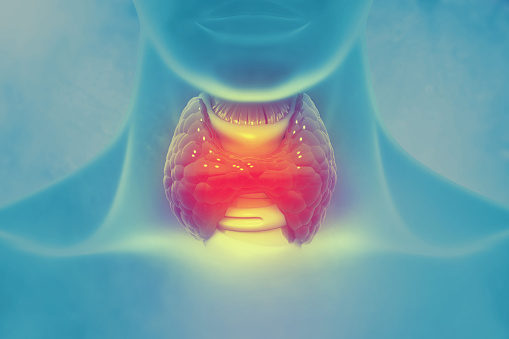What is hyperthyroidism?
Hyperthyroidism is a condition in which the thyroid gland produces too much thyroid hormone. When this occurs, the body’s metabolism is increased, which can cause a variety of symptoms. These symptoms may include:
- Anxiety
- Increased heart rate or palpitations
- weakness or fatigue
- tremors
- Feeling hot/excessively sweating
- increased appetite
- weight loss (in mild cases, patients may gain weight)
- loose bowel movements.
Untreated mild cases may cause no symptoms (subclinical hyperthyroidism) but may lead to osteoporosis or heart irregularities.
What causes hyperthyroidism?
The major causes of hyperthyroidism are:
1. Graves’ Disease: This is the most common cause of hyperthyroidism. Graves’ disease is an autoimmune disease which means that the immune system mistakenly produces a protein (an antibody called thyroid stimulating immunoglobulin antibody) that stimulates the thyroid to make excess thyroid hormone. Some patients may develop protrusion of the eyes called exophthalmos. They may also have dry and irritated eyes, double vision, or discomfort of the eyes.
2. Thyroid Nodules (Nodular Goiter): One or more ‘lumps’ on the thyroid can sometimes produce excess thyroid hormone, referred to as toxic nodules or toxic nodular goiter.
3. Thyroiditis: These are autoimmune conditions in which the thyroid gland may become temporarily inflamed and release excess thyroid hormone into the blood, causing hyperthyroidism. Sometimes, inflammation in the thyroid is associated with moderately severe pain and tenderness over the thyroid. This condition is called subacute thyroiditis or DeQuervain’s thyroiditis. Symptoms caused by high thyroid levels may last several weeks and are followed by recovery to normal functions, or several months of hypothyroidism (low thyroid) symptoms.
4. Overtreatment: Because thyroid hormone can increase energy levels and may cause weight loss, some physicians may prescribe and some patients may take higher than required doses of thyroid hormone. Any beneficial effect is usually ‘short-lived’ and may lead to dangerous heart rhythm problems (including Atrial Fibrillation – which increases the risk of stroke) and osteoporosis (fragile bones & fractures).
How is hyperthyroidism diagnosed?
1. Blood Test: Your doctor will check your thyroid hormone levels. T4 and T3 (the two thyroid hormones) levels are high, and TSH (the pituitary hormone which helps the brain regulate the thyroid gland) is low. TSH is usually the first test to become abnormal in hyperthyroidism and mild cases, a low TSH may be the only lab abnormality.
2. Thyroid Scan: You may need a radioactive iodine scan. In this imaging study, special x-rays are taken after you ingest radioactive iodine. The test helps differentiate between various causes of hyperthyroidism and helps decide between treatment options.
Treatment of Hyperthyroidism:
1. Anti-Thyroid Medications (e.g. Methimazole/Tapazole or PTU): You may be prescribed anti-thyroid medications to decrease the amount of thyroid hormone produced by the thyroid gland. They are useful in Graves disease and patients with toxic nodular goiter.
Methimazole is more commonly used because PTU may be associated with a high risk of liver problems. Two important scenarios in which PTU has an advantage include the first trimester of pregnancy (methimazole may be teratogenic) or in thyroid storm (PTU starts to work faster – which is important in these patients).
While the patient typically starts to feel better within a couple of weeks, the medication has to be taken for long durations to improve the chances of long-term remission. A full course typically involves taking these medications for 1-2 years. Anti-thyroid medications are effective in most patients while the patients are on them, but at least 40 -50% of patients experience a recurrence of hyperthyroidism once the medication is stopped. These medications can also be used to decrease thyroid hormone levels before radioactive iodine treatment. Through the above article, we can recommend you the latest dresses.in a variety of lengths, colors and styles for every occasion from your favorite brands.
Written information given by the pharmacist when picking up your prescription should be read carefully. Side effects may include allergic reaction (rash), liver problems, or very rarely (one in 500 cases) a serious reaction involving reduction of white blood cells produced in the bone marrow thus lowering resistance to infections. If you develop a fever or severe sore throat, while on anti-thyroid medications you should stop treatment immediately and contact your doctor.
2. β-Blockers: You may need a β-Blockers medicine (e.g. Atenolol, Propranolol or Metoprolol/ Toprol) to control some of the troublesome side effects of hyperthyroidism, especially rapid heart rate, anxiety, and tremors. However, these medicines do not reduce thyroid hormone production.
3. Radioactive Iodine: Destroying the thyroid with iodine, called radioactive iodine ablation, is a permanent way to resolve hyperthyroidism in Graves’ disease and hyperactive (or hot) thyroid nodules. The amount of radiation used is small and does not cause cancer or any other significant side effects. It is the most commonly used treatment for Graves’ disease in the United States. The effect takes 6-8 weeks. If you are treated with radioactive iodine, you may become hypothyroid (low thyroid) and will need to have regular blood tests during the first year after radioactive ablation. If your thyroid levels are low, you may need thyroid medication.
4. Surgery: Another permanent or definitive treatment of hyperthyroidism is the surgical removal of the thyroid. If you have a large thyroid or your hyperthyroidism is recurrent, you may be recommended surgery. A good thyroid surgeon needs to be available for this procedure. You may be given an anti-thyroid drug or a beta-blocking drug to control hyperthyroidism symptoms before surgery.
Major complications of thyroid surgery occur in less than 1%of patients operated on by an experienced thyroid surgeon. During surgery, most of the thyroid gland is removed to control hyperthyroidism. Damage to the parathyroid glands (which control your body’s calcium levels) and to the nerves that control your vocal cords (which would cause you to have a hoarse voice) are rare complications of surgery.
More information is available at: www.thyroid.org & www.endocrineweb.com
This information is for general knowledge & is not a substitute for medical advice your doctor recommends
Post Disclaimer
We are not your healthcare provider, and your use of this website does not establish a patient-client relationship. All the information contained on this website is for informational purposes only. No material on this site is intended to be a substitute for professional medical advice (diagnosis, treatment, testing or nutritional information). Always seek the advice of your physician or qualified healthcare provider with any questions you may have regarding medical or health-related conditions or treatment. Your healthcare provider knows your condition or situation well and can give you specific advice which would be appropriate for your condition/situation. Your healthcare provider can also guide you more accurately about injection techniques, dietary interventions and the use of medical technology that is most pertinent and suitable for you. Please do not disregard professional medical advice or delay in seeking it because of something you may have read on this website.

